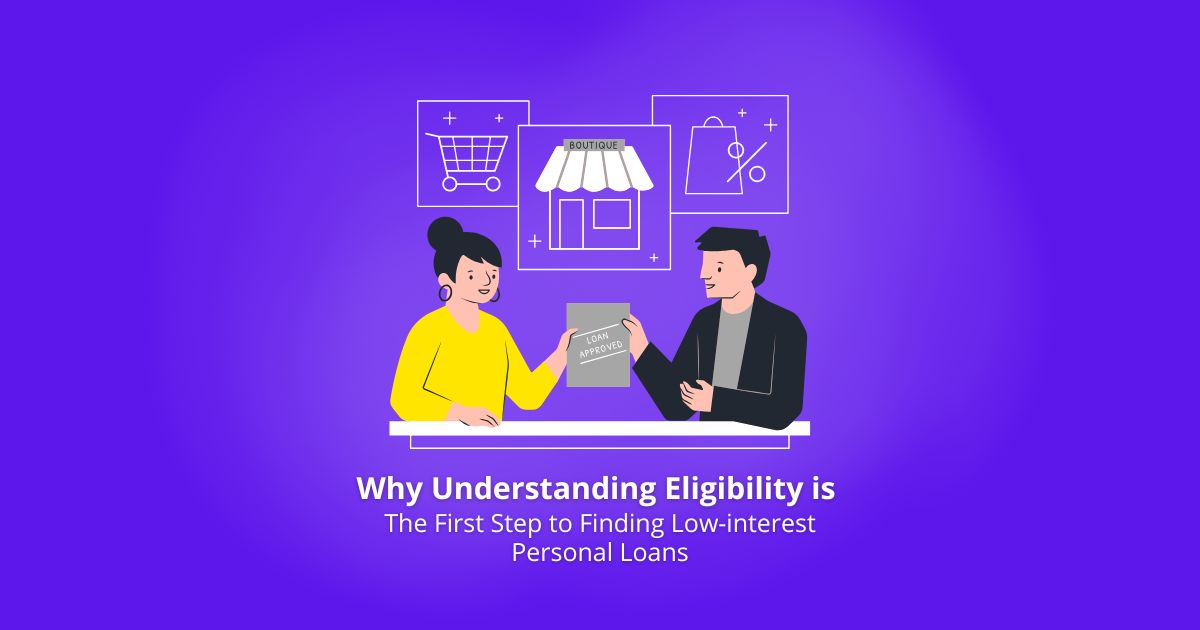Disclaimer
This information is for general purposes only and may not reflect the latest loan terms or rates. Please verify details with lenders and consult a financial advisor before making decisions. We are not liable for actions taken based on this content.
Applying for a personal loan can be an excellent way to meet financial needs, whether it’s for a medical emergency, wedding expenses, or home renovation. However, not every loan applicant is offered the same loan terms. The key to securing low-interest personal loans often lies in thoroughly understanding the eligibility for personal loan. Knowing the criteria not only improves your chances of approval but also ensures you get the most favorable loan interest rates.

What Does Eligibility for Personal Loan Mean?
Eligibility for personal loan refers to the set of criteria lenders use to evaluate whether an applicant qualifies for a loan. These parameters are crucial in determining not just your approval but also the terms of the loan, including the interest rate, loan amount, and tenure.
Each lender may have slightly different eligibility requirements, but they typically assess:
-
Income and employment: Stability and level of income play a significant role.
-
Credit score: Reflects your repayment history and financial discipline.
-
Age: Most lenders have a minimum and maximum age limit.
-
Debt-to-income ratio: A high ratio may indicate financial strain.
-
Residency status: Some lenders only provide loans to residents of specific locations.
Why Eligibility Affects Loan Interest Rates
Understanding eligibility is crucial because it directly impacts the personal loan interest rates you’re offered. Borrowers with strong financial profiles are considered low risk, which often translates into lower interest rates. Conversely, if you barely meet the eligibility requirements, lenders might classify you as high-risk and charge higher rates to mitigate their risks.
For instance:
-
A borrower with a credit score above 750 and an income of Rs. 1,00,000 per month may secure an interest rate as low as 9%.
-
A borrower with a credit score below 650 and an income of Rs. 25,000 per month may face rates of 14% or higher.
How to Determine Your Eligibility for Personal Loan
Before applying, it’s wise to assess your eligibility using the following steps:
- Check your credit score
A credit score above 700 is generally considered good. If your score is below this, consider improving it by paying off outstanding debts or correcting errors in your credit report. - Evaluate your income and expenses
Most lenders require applicants to have a minimum income, which can vary by city and loan amount. Make sure you also account for your monthly expenses and other obligations to ensure your EMI is affordable. - Review your employment status
Salaried individuals with stable jobs and regular incomes often find it easier to meet eligibility requirements compared to those with irregular earnings. - Understand your debt-to-income ratio
Your total monthly debt payments divided by your monthly income should ideally be below 40%. A higher ratio can reduce your chances of approval or lead to higher interest rates. - Use an eligibility calculator
Many lenders offer online tools to check your eligibility for personal loan. These calculators give an estimate based on your financial details, helping you decide whether to proceed with the application.
Tips to Improve Eligibility for Personal Loan
If you find that you don’t meet the required eligibility criteria, there are steps you can take to enhance your chances:
-
Improve your credit score: Pay off outstanding debts, avoid late payments, and reduce your credit utilization ratio to boost your score.
-
Opt for a longer tenure: While this increases the total interest payable, it lowers your monthly EMI, making the loan more manageable and increasing your eligibility.
-
Include a Co-applicant: Adding a co-applicant with a strong financial profile can improve your chances of approval and help secure better terms.
-
Reduce existing debts: Clearing off a portion of your current liabilities can lower your debt-to-income ratio and make you more appealing to lenders.
-
Negotiate with lenders: If you have a strong relationship with your bank or financial institution, they may offer more lenient terms or waive certain requirements.
How Understanding Eligibility Saves Money
Being aware of your eligibility for personal loan is not just about getting approved—it’s about saving money. Let’s consider an example:
-
Borrower A checks their eligibility and applies with a strong financial profile, securing a loan of Rs. 5,00,000 at an interest rate of 10%. Over 5 years, they pay Rs. 1,37,500 as total interest.
-
Borrower B applies without reviewing their profile and secures the same loan at 14%. Over 5 years, they pay Rs. 1,97,000 as total interest.
The difference in interest cost—Rs. 59,500—shows how understanding eligibility can significantly impact the affordability of your loan.
Low-interest Personal Loans and Eligibility
Securing low-interest personal loans requires more than just shopping around for the best rates; it starts with presenting yourself as an ideal borrower. By understanding and meeting eligibility requirements, you position yourself to negotiate better terms and reduce overall borrowing costs.
Conclusion
Eligibility for personal loan is not just a box to tick—it’s the foundation for smart borrowing. A clear understanding of the criteria helps you improve your chances of approval and ensures you qualify for the most favorable loan interest rates. Whether you’re borrowing Rs. 1,00,000 or Rs. 10,00,000, taking the time to evaluate and enhance your financial profile is the first step to securing a loan that works for you.
Remember, borrowing is a responsibility, and understanding your eligibility empowers you to make informed decisions, ensuring a stress-free and cost-effective experience.